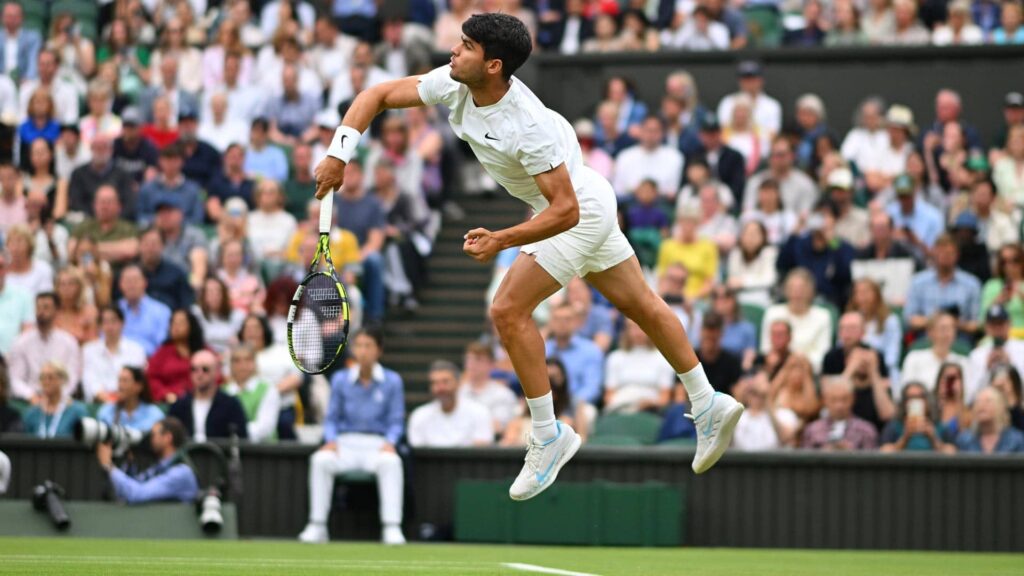Banana Skin Muffins & Vegan Victoria Sponge Highlight Wimbledon’s Sustainability Efforts for 2024
4 Mins Read
Wimbledon is serving up vegan and zero-waste treats to guests at this year’s tournament, as the Grand Slam’s organisers level up their sustainability efforts.
Plant-based Victoria sponge cake and waste-free banana muffins are the top showcases on the menu at Wimbledon 2024, with the tournament’s organisers highlighting just how much dairy impacts the environment.
It marks the first time the All England Club has offered a vegan version of the iconic English cake, which swaps out conventional butter and cream for Flora’s plant-based spread and coconut cream, respectively. The new offering is being served as part of an afternoon tea set to around 1,000 guests who are paying up to £2,500 per ticket for the Championships.
“In our hospitality suites, we serve traditional afternoon tea, and instead of doing small cakes loaded with butter and cream, we’re doing a plant-based Victoria sponge which is produced on-site from our pastry team,” said Adam Fargin, executive chef of the All England Club.
Why Wimbledon decided to serve vegan Victoria sponge

At Wimbledon, all dishes are being carbon-labelled, with scores from A (very low impact) to E (very high impact). Fargin outlined how dairy-based Victoria sponge has nearly twice the carbon emissions (with a D rating) of the plant-based recipe (which has a B score). The former’s emissions are equivalent to 120 smartphone charges.
Fargin noted the All England Club’s wish to move away from dishes “loaded with butter and cream”. “As soon as you put cream in the carbon emissions go through the roof,” he said.
While the team had trialled an “oat-based solution” for the filling (given Wimbledon serves an oat-cream-based alternative to its famous strawberries and cream), it lacked the required “viscosity” to keep stable.
In the end, they settled on Flora and coconut cream. “It’s really important to note that we make these changes based on flavour as well. So we wouldn’t serve that because it’s plant-based – we believe that tastes as good as [any] Victoria sponge,” said Fargin.
“It is really important for us that we have that balance between ‘does it taste great’ and ‘is it great for the environment’,” he added.
The vegan Victoria sponge accompanies a fully plant-based afternoon tea menu as part of Wimbledon’s picnic packages, which include both at-home and at-the-Championships editions.
The £75 on-site picnic menu includes New York deli and coronation chickpea sandwiches, two fruit scones, vegan clotted cream and strawberry jam, raspberry and pistachio financier, carrot cake, and salted caramel tart, two hot drink vouchers, and – of course – strawberries and cream.
As for the at-home menu (£69 plus delivery), this entails savoury items like vegan cracked black pepper cheese, red pesto pâté, and a sweet potato, kale and paprika roll (among others), cakes such as lemon posset and chocolate and cherry pudding, as well as the aforementioned scones, accompaniments, and strawberries and cream.
Wimbledon aiming for net zero by 2030

Extending its sustainability efforts, Wimbledon is also serving up zero-waste dairy-free muffins made from banana skins. Topped with oats and sunflower seeds, these are available at the players’ restaurant.
“One of the players’ favourite items of food is bananas,” Fargin said. “The banana skin, historically, that would be thrown away and not thought about. Actually, that banana skin has got bags of flavour, in terms of what it can offer if you treat it the right way. It’s very nutritious, as much as the banana itself.
“These muffins are made from the banana itself and the skin, we make them fresh every day and then we deliver that into our players’ spaces.”
The decision to use up banana skins stemmed from the fact that the tennis players at the Championships consume 3.3 tonnes (or about 30,000 pieces) of bananas each tournament.
“The best way to do it is to slightly ferment [the skins],” explained Fargin. “If you take the skin and you salt them for like 24 hours under vacuum, it just starts to break down the fibres of that, which would then help with the blending. So you would blend that with the bananas, with the flour, and it turns into your muffin mix.”
Wimbledon has been amping up its sustainability efforts of late – including using spent coffee grounds as compost for flowers – with a goal to reach net-zero emissions and contribute to a net gain in biodiversity by 2030.
The Grand Slam’s organisers have been facing calls, however, to drop the tournament’s sponsorship contract with Barclays. The bank has heavy ties to the fossil fuel and livestock industries – it has invested $235B in fossil fuels since 2016, and has been the second-largest private lender of meat and dairy companies since 2015, pumping in $28B.
Novak Djokovic, who is aiming for a joint-record eighth Championship title this year, follows a plant-based diet, as does Polish star Hubert Hurkacz, who was knocked out in the second round this year.



